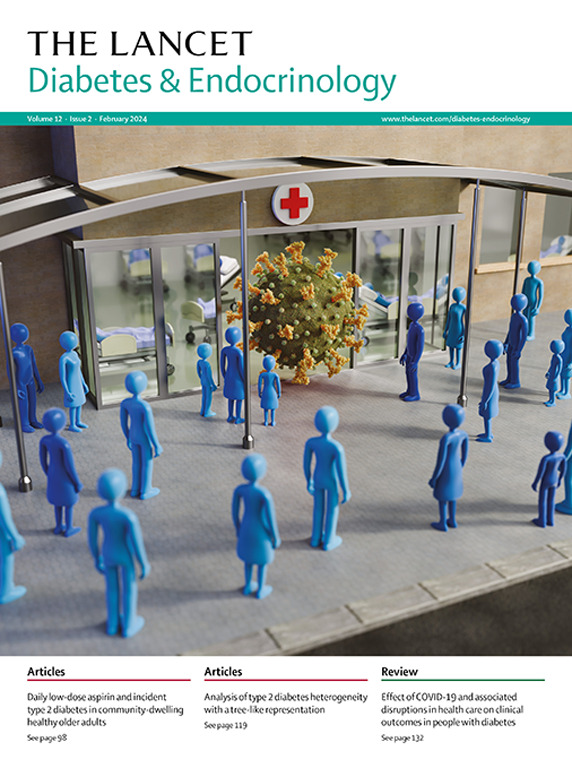Redifferentiation therapy in unresectable or metastatic radioactive iodine refractory thyroid cancer: an International Thyroid Oncology Group statement
IF 41.8
1区 医学
Q1 ENDOCRINOLOGY & METABOLISM
引用次数: 0
Abstract
In patients with follicular cell-derived thyroid cancer that have distant metastases and no iodine uptake, redifferentiation—ie, the restoration of tumoural 131I uptake with systemic therapy—is now possible. The use of mitogen-activated protein kinase (MAPK) inhibitors for a short period of time before the administration of high activity 131I shows promising results with iodine uptake restoration and tumour response. Redifferentiation has been used in patients with BRAF-mutated and RAS-mutated tumours in prospective trials and in the case of patients with RET or NTRK fusions. The iodine uptake restoration ranges from 33% to 95%, and tumour response rates from 11% to 80%. There is substantial variability between trials with regards to inclusion criteria, duration of redifferentiation drug therapy, activity of radioactive iodine, and use of dosimetry. Randomised studies are missing to clearly establish the effectiveness and applicability of redifferentiation. Thus, long-term studies are needed to establish the most effective redifferentiation protocols. The objectives of this Review are to: (1) provide a comprehensive review of the available results from prospective trials and case reports, including results regarding the restoration of radioiodine uptake and treatment efficacy (morphological and biological); (2) describe the differences in redifferentiation trial design between studies and discuss their potential impact on treatment efficacy; (3) describe the implications and limitations of dosimetry; and (4) outline the key questions to be addressed in future redifferentiation trials.不可切除或转移性放射性碘难治性甲状腺癌的再分化治疗:国际甲状腺肿瘤小组声明
滤泡细胞源性甲状腺癌有远处转移且无碘摄取的患者,再分化-即通过全身治疗恢复肿瘤的碘摄取-现在是可能的。在使用高活性131I之前,短时间内使用丝裂原活化蛋白激酶(MAPK)抑制剂显示出有希望的碘摄取恢复和肿瘤反应结果。在前瞻性试验中,再分化已用于braf突变和ras突变肿瘤患者以及RET或NTRK融合患者。碘摄取恢复范围为33%至95%,肿瘤反应率为11%至80%。在纳入标准、再分化药物治疗的持续时间、放射性碘的活性和剂量学的使用方面,试验之间存在很大的差异。缺乏随机研究来明确确定再分化的有效性和适用性。因此,需要长期研究来建立最有效的再分化方案。本综述的目的是:(1)对前瞻性试验和病例报告的现有结果进行全面审查,包括有关恢复放射性碘摄取和治疗效果(形态学和生物学)的结果;(2)描述研究间再分化试验设计的差异,并讨论其对治疗疗效的潜在影响;(3)描述剂量学的意义和局限性;(4)概述未来再分化试验中需要解决的关键问题。
本文章由计算机程序翻译,如有差异,请以英文原文为准。
求助全文
约1分钟内获得全文
求助全文
来源期刊

The Lancet Diabetes & Endocrinology
ENDOCRINOLOGY & METABOLISM-
CiteScore
61.50
自引率
1.60%
发文量
371
期刊介绍:
The Lancet Diabetes & Endocrinology, an independent journal with a global perspective and strong clinical focus, features original clinical research, expert reviews, news, and opinion pieces in each monthly issue. Covering topics like diabetes, obesity, nutrition, and more, the journal provides insights into clinical advances and practice-changing research worldwide. It welcomes original research advocating change or shedding light on clinical practice, as well as informative reviews on related topics, especially those with global health importance and relevance to low-income and middle-income countries. The journal publishes various content types, including Articles, Reviews, Comments, Correspondence, Health Policy, and Personal Views, along with Series and Commissions aiming to drive positive change in clinical practice and health policy in diabetes and endocrinology.
 求助内容:
求助内容: 应助结果提醒方式:
应助结果提醒方式:


